Module3 Unit 9 Lesson 1
Module9Unit3教案-七年级英语上册

《英语》(新标准)(初中阶段)七年级上册M9U3教学设计Module 9 People and placesUnit 3 Language in use教材分析本单元是第一、第二单元的综合,是前两个单元语言知识的运用平台,即现在进行时态的使用。
其中,本单元的“Around the world”内容上与第二单元不同地方的人们在同一时间的不同行为相呼应,并拓展了相关知识,帮助学生在体验中外文化的异同中形成跨文化意识。
教学目标1. 语言知识目标:能用“ be doing something” 的结构描述正在做或正在发生的事情2. 语言技能目标:1) 能够根据图片、视频、真实行为等描述自己或他人正在做或正在发生的事情2) 通过阅读,能够仿写明信片3) 归纳现在进行时中动词的变化规则3. 学习策略:1) 通过观察重点句型,了解本模块的语言点2) 在小组合作的过程中互相学习4. 文化意识:了解不同地方人们生活上的异同5. 情感态度:通过了解其他国家或地区人们的生活,让学生提升对异国文化和生活习俗的兴趣,加深对本国文化的认识教学重点与难点重点:运用be doing something 结构描述正在发生的事情难点:运用现在进行时制作一则广播报道教学辅助电脑,投影仪,白板教学策略根据学生对前两个单元的掌握情况,灵活采用传统互动结合法的策略教学内容教学活动设计意图教师活动学生活动步骤 1 1. 复习 1. 通过复习Unit 12的标复习与热身(7分钟)1) 复习第1,第2单元的标题,大声朗读第2单元的短文。
2) 接力背诵短文。
2. 游戏11) 老师示范“猜国家”的游戏。
如:It’s twelve o’clock now. People aren’tworking. They are having lunch. They are eatinghotdogs or hamburgers for lunch. Where arethey?2) 让学生仿照老师,描述一个被猜的国家。
外研版英语九年级上册(教学设计)Module 9 Unit 1
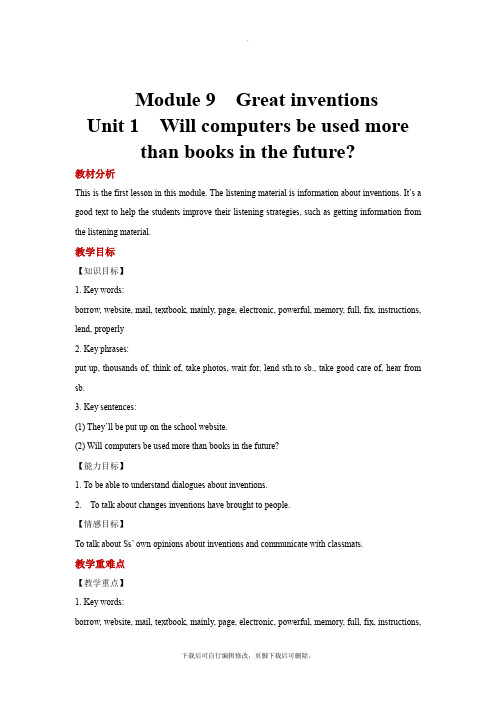
Module 9Great inventions Unit 1Will computers be used more than books in the future?教材分析This is the first lesson in this module. The listening material is information about inventions. It’s a good text to help the students improve their listening strategies, such as getting information from the listening material.教学目标【知识目标】1. Key words:borrow, website, mail, textbook, mainly, page, electronic, powerful, memory, full, fix, instructions, lend, properly2. Key phrases:put up, thousands of, think of, take photos, wait for, lend sth.to sb., take good care of, hear from sb.3. Key sentences:(1) They’ll be put up on the school website.(2) Will computers be used more than books in the future?【能力目标】1. To be able to understand dialogues about inventions.2. To talk about changes inventions have brought to people.【情感目标】To talk about Ss’ own opinions about inventions and communicate with classmats.教学重难点【教学重点】1. Key words:borrow, website, mail, textbook, mainly, page, electronic, powerful, memory, full, fix, instructions,lend, properly2. Key phrases:put up, thousands of, think of, take photos, wait for, lend sth.to sb., take good care of, hear from sb.3. Key sentences:(1) They’ll be put up on the school website.(2) Will computers be used more than books in the future?【教学难点】To improve listening and speaking abilities.课前准备Multimedia教学过程Step I Warming up and leading in(I) Warm up(A) T introduces four great inventions in ancient China: compass, paper-making gunpowder and printing.(B) T: With the electronic technology, we have more electronic inventions.Ss name more electronic inventions and talk about them.(II) IntroductionWork in pairs. Look at the pictures and answer the questions.(III) PracticeListen and complete the sentences.【设计意图】通过对图片的直观观察和讨论以及对问题的答复,使学生熟悉相关词汇,熟悉本单元话题,并导入新课。
二年级英语下册 Module 9 Unit 1(3)课件 外研版(一起)
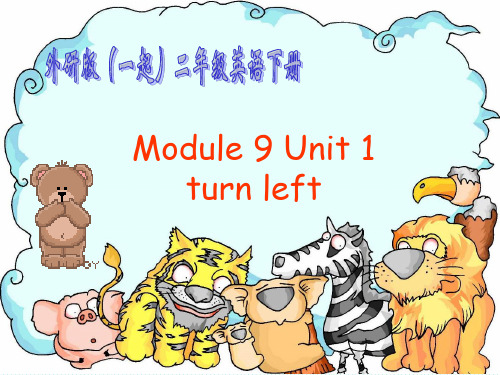
bank
post office
zoo
cinema school
library hospital
TV station bookshop
restaurant Children’s park
shopping center museum
factory
police station park
shoe shop hotel
Can / Could you tell me the way to the_h_o_t_e_l ? Yes . Turn __r_ig_h_t_ out of the hospital. Go straight ahead and take the __f_ir_s_t_ __l_ef_t__. It’s on the ___le_f_t___.
hotel
factory
Could / Can you tell me the way to… ? Yes . Turn right / left out of the hotel.
Go straight ahead and take the first left / right.
Could you tell me the way to your home ?
Yuangang Primary School
Yes . Turn right / left out of the school. Go straight ahead and take the first / second / third left / right. It’s on the left / right.
museum zoo
library shopping center post office
Unit 9 Learning 大单元说课课件高中英语北师大版(2019)必修第三册
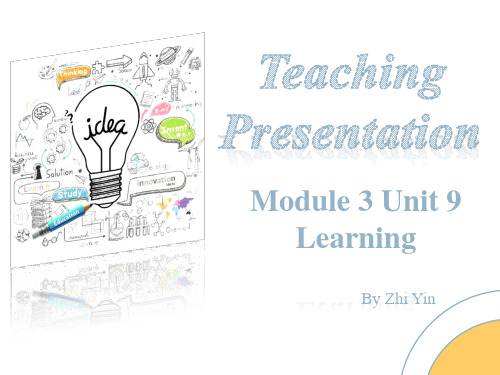
Step 1
Step 2 Reading Post-reading Step 3
Step 4
Step 5
Activity 8
Which of these suggestions do you think is the most useful for you?
Intention
To practice critical thinking
What attitude should be adopted to deal with learning and life under different cultural backgrounds so as to improve students' logical and critical thinking
Theme: Human & Self
What
Topic: Learning
Aim: To form correct outlook on
Why
learning & strive to be an active lifelong learner
Value Orientation: Willing to learn, good at learning, lifelong learning
Method
Activity-based Teaching
Method
Individual Study
Communicative Teaching Method
Cooperative Study
Audio-visual Teaching Method
P art
大观念 小观念 单元目标 语篇 学生活动 学生评价
上海牛津版七年级英语下册module 3 unit 9课本同步笔记

U9P591.the natural elements 这自然元素2.read the story 读这个故事/ tell a story 讲一个故事/ storiesthe paragraphs of the story 故事的段落/ in the correct order 以正确的顺序after reading the story 读完这故事后/ learn from the story 从这故事中学习3.the competition between Mr. Wind and Mr. Sun 风先生和太阳先生之间的竞赛have a competition 进行一次竞赛/ compete v.4.blow houses down = blow down houses 吹倒这些房子blow it/ them down 把它/ 它们吹倒代词只放中间write it/ them down 写下它/ 它们5.on the blackboard 在这黑板上/what kind of person 什么种类的人6.answer the questions 回答问题the answer to the question 这问题的这答案7.show his strength 展示他的力气strong- stronger- the strongest8.finally = at last= in the end 最后9.show sb sth = show sth to sb 给某人展现某物show sb around sp 带领某人参观某地show- showed- showed10.a ticket for the film 这部电影的一张票子a plan for the visit 这次参观的一个计划the programme for their Open Day 他们的开放日的这个活动安排the reason for ... 这个理由对于...the key to the door 这个门的这个钥匙the answer to the question 这个问题的这个答案the way to the school 到学校的这条路an exit / entrance to the cinema 到电影院的一个出口/ 入口11.balcony- balconies/ nationality- nationalities puppy-puppies country-countries /family-families / factory-factories / secretary-secretaries/ hobby- hobbies/company- companies/ society- societies/ activity- activities/ battery- batteries/ party- parties/ observatory- observatories/ century-centuries/diary-diaries 日记/ dairy-dairies 奶制品厂trolley- trolleys / monkey- monkeysP601. a paragragh 一段/ in the correct order 以正确的顺序/ make a story 编一个故事/tell a story 讲一个故事/ tell a lie 撒一个谎2.be proud of (doing) sth 是骄傲的对于做某事/ his pride 他的骄傲3.show off his strength 炫耀他的力量/ have a competition 举行一次竞赛4.all the time / always 总是/ each other = one another 彼此/ become red 变红5.as strong as 和...一样强壮as+形容词/副词原级+as 和...一样...6.get the man’s coat off = get off the man's coat 使这个男人的帽子掉落get it off 使它掉落7.begin to blow hard 开始猛烈地吹/ begin doing sth=begin to do sth 开始做某事8.hold his coat more tightly 更紧地抓住他的衣服/ be tight 是紧的in the wind 在风里/feel very tired 感到非常累/ look disappointed 看上去失望的9.make plants grow 使植物生长/ make sb. (not) do sth. 使某人(不)做某事10.push boats forward 推动船向前/ the man over there 特指在那边的那个男人11.in the shortest time 在最短的时间内/ let me try 让我试试12.shine brightly 明亮地照耀/ be bright 是明亮的/ shining/ shines13.warmer and warmer 越来越温暖/ more and more beautiful 越来越美丽14.start sweating 开始流汗/ start doing sth = start to do sth 开始做某事15.take off 脱掉, 起飞/ put on 穿上/wear 穿着/ land 着落16.say sadly 伤心地说/ be sad 是伤心的/ look sad 看上去伤心的17.I’m not as strong as you.= I’m not so strong as you. 我不如你强壮You are stronger than me. 你比我强壮18.Let's be friends forever.让我们永远成为好朋友19.become angry 变得生气的/ do sth angrily 生气地做某事like / love / begin / start/ to do sth (to do 和doing sth 意思差不多)remember doing sth 记得做过某事/ remember to do sth 记得去做某事forget doing sth 忘记做过某事/ forget to do sth 忘记去做某事stop doing sth 停止做某事/ stop to do sth 停下来去做某事22.联系动词感官动词look, seem 看上去/smell 闻上去/ taste 吃上去sound 听上去/ feel 感觉taste nice 吃上去美味的/ feel happy 感觉快乐的是变得长得be / go / get / grow/ turn / becomeget angry 变得生气的/go bad 变得变质的/ go wrong 变得错误的grow healthy 长得健康的/grow strong 长得强壮的/become angrygrow bigger 长得更大/ turn red 变得红的/ turn yellow 变得黄的使,保持make / keep / stay/ remainmake safe/ keep safe 保持安全/ keep warm 保持温暖make me happy 使我快乐/make sick people better 使病人好点make our city a safe place 使我们的城市成为一个安全的地方keep the class rules 保持(遵守)这些班级规则keep healthy, stay healthy 保持健康的keep strong, stay strong 保持强壮的keep them clean 保持它们是干净的23.Let’s do sth, shall we? Let us do sth, will you?Open the door, will you? Don’t open the door, will you?24.提建议Let’s do sth, shall we? / Shall we do sth?How / What about (doing) sth? Whynot do sth?回答O.K./ All right/ That’s a good idea.25.ask / tell/ want / promise 承诺/ warn 警告/ would like sb (not) to do sthmake / let/ have/ would rather 宁愿/ had better 最好sb (not) do sth要某人做(不做)某事hope (not) do sth / I hope +(that) + 句子P611.teach you how to make a kite 教你如何做一个风筝teach you to make a kite 教你去做一个风筝to make a kite 去做一个风筝= for making a kite 为了做一个风筝to do sth 去做某事= for doing sth 为了做某事2.some thin sticks 一些细棍/ some pieces of coloured paper 几张有颜色的纸a colourful life 一个丰富多彩的生活/ a reel of string 一卷线轴e some thin sticks to make a frame 用一些细棍去做一个框架use sth to do sth 用某物去做某事=use sth for doing sth 用某事为了做某事4.stick a piece of coloured paper onto the frame 粘一些有颜色的纸到这个框架上5.put a tail on the end 放一个尾巴在末尾上finally = at last = in the end 最后/ at the end of the street 在这街道的末尾6.tie the frame to a reel of string 系这个框架到一卷线轴上tie sth to sth 把某物系到某物上去7.make the kites themselves 他们自己做风筝8.whose kite 谁的风筝9.first, / next, / then / finally, / (then 后面没逗号)P621.bigger and more beautiful 更大更漂亮bigger/ redder/ thinner/ fatter/ hotter/ sadder/ wetter2.not as beautiful as yours= not so beautiful as 不如你的漂亮3.the biggest and the most beautiful最高级: in my class /of the three / among the three4.Her kite is not as beautiful as yours. = Yours is more beautiful than hers.Their kite is not as colourful as ours. = Ours is more colourful than theirs.P631.when the wind blows 当风吹起时2. a leaf / leaves3.across the sky 划过天空4.rise and dive 升起和俯冲/ in the sky 在天上/in space 在太空5.flap- flapped- flapped 拍打6.sailing boats 帆船/ v. sail7.speed over the sea 快速划过海面8.write a poem about the wind 写一首关于风的诗write- wrote- written- writing / a writer9.bow and sway among the grass 在草丛中弯曲和摇摆10.half-halves/ knife-knives/ shelf-shelves/ loaf- loaves 只scarf-scarves/ leaf-leaves/ wolf-wolves/ wife-wives/ myself-ourselvessleeve- sleevesP641. a cloud 一朵云/ clouds2.move across the sky 移动过天空/ move- moved- moveda moving film 一部令人感动的电影/ be moved 是感动的3.show dimples on her big, round face 在她的大圆脸上秀出酒窝4.on a beautiful day 在一个美丽的日子里5.smile with a happy face 带着一张快乐的笑脸微笑/ with a smile 带着一个微笑smile- smiled- smiled6.主格:I / you / he / she / it / we / you / they宾格: me / you / him / her / it /us / you / them反身代词myself /yourself /himself /herself /itself /ourselves /yourselves/themselves名词性物主代词:mine/ yours/ his/ hers/ its/ ours/ yours/ theirs/ Mary’s形容性物主代词:my /your /his /her /its /our /your /their /Mary’sWriting: When the wind blowsWhen the wind blow, flowers bow and sway among the grass and leaves fly from the trees across the sky. When the wind blows, clouds slide and hide and they move across the sky. When the wind blow, I see kites fly in the sky. I see sailing boats lean and speed over the sea. I see water smile. How wonderful the wind is. I like the windy weather very much.。
《新标准英语》(三年级起始)Book 3Module 9 Unit 1 Can I have some sweets?词汇教学活动设计
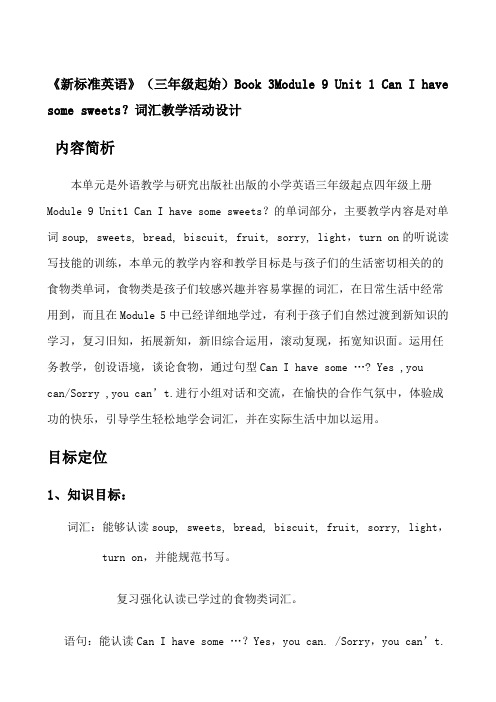
《新标准英语》(三年级起始)Book 3Module 9 Unit 1 Can I have some sweets?词汇教学活动设计内容简析本单元是外语教学与研究出版社出版的小学英语三年级起点四年级上册Module 9 Unit1 Can I have some sweets?的单词部分,主要教学内容是对单词soup, sweets, bread, biscuit, fruit, sorry, light,turn on的听说读写技能的训练,本单元的教学内容和教学目标是与孩子们的生活密切相关的的食物类单词,食物类是孩子们较感兴趣并容易掌握的词汇,在日常生活中经常用到,而且在Module 5中已经详细地学过,有利于孩子们自然过渡到新知识的学习,复习旧知,拓展新知,新旧综合运用,滚动复现,拓宽知识面。
运用任务教学,创设语境,谈论食物,通过句型Can I have some …? Yes ,youcan/Sorry ,you can’t.进行小组对话和交流,在愉快的合作气氛中,体验成功的快乐,引导学生轻松地学会词汇,并在实际生活中加以运用。
目标定位1、知识目标:词汇:能够认读soup, sweets, bread, biscuit, fruit, sorry, light,turn on,并能规范书写。
复习强化认读已学过的食物类词汇。
语句:能认读Can I have some …?Yes,you can. /Sorry,you can’t.2、技能目标:词汇:能听懂并能口头运用soup, sweets, bread, biscuit, fruit, sorry, light,turn on.强化运用已学过的食物类词汇。
语句:能听懂并能口头运用Can I ha ve some …?征求同意或许可,并能口头运用Yes,you can. /Sorry,you can’t.回答这类问句。
复习强化运用已学语句: Can you…? Yes,I can./No, I can’t.复习旧知,引出新知,自然过渡到新句型Can I have some …?Yes,you can. /Sorry,you can’t.的学习,并形成对比。
外研版三年级英语下册Module9Unit1I’vegotanewbook课件

animals.
new book too,
Daming?
Yes, I have. Look, it’s about sport.
It’s a nice book.
Listen, point and find “I’ve got…”
Have you got a No, I haven’t.
Have you got a
about 关于 animal 动物
Let’s learn.
I have got a book. The book is about sports.
sport 运动
Let’s play.
摘红旗
黄队和蓝队抢读单词并翻译,每抢对一个就上一
级台阶,最先摘得“红旗”的小组获胜。
hascaTsdalwnobip-vrnaiseooemhteausrigtsatreoltrst
2. —Have you got a pen? —Yes, I have./ No, I haven’t.
•不习惯读书进修的人,常会自满于现状,觉得再没有什么事情需要学习,于是他们不进则退。经验丰富的人读书用两只眼睛,一只眼睛看到纸面上的话,另 一眼睛看到纸的背面。2022年3月31日星期四2022/3/312022/3/312022/3/31 •书籍是屹立在时间的汪洋大海中的灯塔。2022年3月2022/3/312022/3/312022/3/313/31/2022 •正确的略读可使人用很少的时间接触大量的文献,并挑选出有意义的部分。2022/3/312022/3/31March 31, 2022 •书籍是屹立在时间的汪洋大海中的灯塔。
What is Daming doing? Daming在做什么?
Listen, point and say.
外研版三年级上册英语课件库全册课件三起点
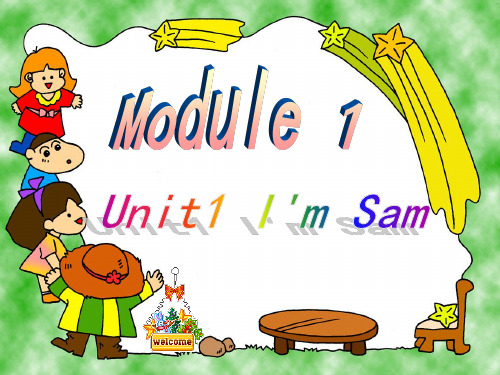
58
Important sentences (重点句子)
Good afternoon, I’m Mr Li. ---What’s your name? ---I’m…
59
追太阳
早上6点到中午12点
中午12点到下午6点
60
Ms or Mr
Good afternoon, I’m Ms Liu. Good afternoon, I’m Mr. Wang.
各组选出一名同学扮演policeman(警察), 去询问其他同学的名字.
56
Activity 2
看图,听录音 Group work :小组合作,Sam 在
和谁说话?Mr Li 为什么要问Sam 的名字?
57
我是模仿小天才
Listen to the tape and follow it.
我是一个可爱的女孩。
Page 46
Boys and girls.
a boy 一个男孩 a girl 一个女孩 many boys. 很多男孩 many girls. 很多女孩
男孩,女孩的复数 记得要加s哦。
Page 47
Listen and say
Hello!你好!
Hello, boys! 男孩们,你们好!
Say and do:
Point to the…
90
孩子们,你们真棒,今天又学会了一些新的英语知识,很快 乐吧?请大家晚上听录音并跟读,模仿每位角色的发音,并将 这些口语运用到生活中去,跟爸爸妈妈和小伙伴们一起说说, 记得用英语哦。
91
Module 4 Unit 1
It’s red
它是红色的
92
65
外研版初中英语七年级上册(WY)教案 Module 9 Unit 1

Module 9 People and places一、教学内容:Unit 1 We’re enjoying the school trip a lot.二、课型:Listening and speaking三、教学目标:1、能掌握本单元的词汇及短语:call, lie, lie in the sun, take photos,wait, walk, a few, enjoy, go back2、能掌握现在进行时态be (am /is /are) +doing的用法和结构。
3、能听懂含有现在进行时态的简短对话.4、能转述正在做或发生的事情;能根据图片、视频、真实行为等描述正在发生的事情。
四、教学重难点:掌握现在进行时态句子的肯定,疑问与否定形式,并能用现在进行时态叙述正在发生的事情。
五、教学准备:本课指导学生通过听力获取信息,培养学生听力技能。
教师在教学时尽量用游戏,图片或flash动画的多种媒体来引起学生的学习兴趣,引导学生在交际中动态生成,学生有话可说,乐于合作分享。
这样就有利于他们更好的运用课本知识,达到提高综合运用语言能力的目的。
同时培养学生的合作精神,发展其思维和想象等能力。
在教学过程中,采用多媒体手段辅助教学,利用各种图片和习题任务贯穿整个教学过程。
因此,本节课需准备:PPT课件、挂图、录音机、课堂练习表格、奖品。
六、预习要求:1、根据音标自学本课新单词;2、查找相关资料,找出你认为本课较重要的语言点和短语。
Lead in1.Free talk:(1).Show some pictures and ask Ss like these: What is he/ she doing now?Where are they ? What are they doing now?(2).Show more pictures and let Ss talk about them, try to use the sentences with “be doing .”Task1:Check the newwords.1. Show some pictures and thing s to get the students to say out the new words and phrases.anize the students to read the new words together.3.Ask the Ss to describe 1.Look at the pictures and things to say out the new words and phrases.2. Read the new words and phrases together.3. To describe the picture and try toTask2:listening1.Play the tape, ask thestudents to listen andnumber the pictures.(Activity 2)2.Ask the students toListen to the conversation carefullyand match the people 1-5with the actions a-g.T: “Now, we are goingto listen to a dialoguebetween Betty and hermum. Betty is in Chinaand her mum is at home inAmerica. Let’s listenand match.”1.Betty a. eat an iceg. buy presentsstudents to check their answers. students the the work to read the conversation. 3. Have a competition: in the the anize students to come to the blackboard some language points that they found. 2.Help the students to difficult 3.Check theanswers.1.Read the conversation with the video.2. Read the conversation ingroups.3. Read the dialogue in groups and choose the best group.1. Students come tothe blackboard to show out somelanguage points,the other students listen to them carefully and note .2.Solve the difficult points.with the teacher ’s help.thethecomplete the table.(Activity 3)the students to underlinecorrect3. Ask the students towhattheusing3. 1.Students complete the table.(Activity 3)2.Students underline the correct words. (Activity 4)3.Students work in pairs .Say what people are doing in the conversation, using the form in Activity 3.Task 6:Do some speaking 1.Work in pairs. Ask students to talk about the photos wh ich they brought and say what people are doing in the photos at the moment . A: This is a photo of my familyI’m sitting on thegrass andreading. My father /mother /brother /sisteris …... We are having a good time. B: In this photo, we are enjoy ing the schooltrip. Li Ming is …Tony is …2. Have some students to come to the blackboard to talk about the ir photos.3.Play a guessing game. Have some Ss to do the actions in front of the class. The other Ss guess what is he doing.4.Ask students to do someExercises and then check. game. Some Ss do the actions in front of the class. The other Ss guess what is he doing.4.Do the exercises , then check.达标训练题一、单项选择()1.At the moment,everyone dumplings.A. are eatingB. eatingC. is eatingD. eat()2.Listen! She in the classroom.A. is singingB. singC. to singD. is sing()3.Americans like the sun.A. lie inB. lying inC. to lie unde rD. lying on ()4.My father enjoys piano.A. to playB. playingC. play theD. playing the()5.This is not easy work.A. aB. /C. oneD. an二、用所给动词的适当形式填空。
牛津上海版(三起)英语六年级上册Module 3 Unit 9 单元测试卷(含答案)

Unit 9 Great cities of the worldPart 1 Listening (第一部分听力)30%I. Listen and choose (听录音,选出听到的内容)6%( ) 1. A. north B. mouth C. south D. month ( ) 2. A. dumplings B. chips C. buildings D. museum ( ) 3. A. get to B. get up C. get off D. get on ( ) 4. A. 2.5 hours B. 2 hours C. 3.5 hours D. 3 hours ( ) 5. A. How long does it take to get to Shanghai from Hangzhou?B. How long does it take to get to Beijing from Hangzhou?C. How long does it take to get to Hangzhou from Shanghai?D. How long does it take to get to Hangzhou from Beijing?( ) 6. A. These two cities are far away from each other.B. These two sisters live far away from each other.C. These two places are far away from each other.D. The two sisters' houses are far away from each other.II. Listen and number (听录音,按顺序给图片编号) 6%Beijing ( ) Tokyo ( ) London ( )Shanghai ( ) Sanya ( ) Paris ( )III. Listen and choose (听录音,选出相应的应答句) 6%( ) 1. A. It takes fifteen minutes. B. It took ten minutes. C. It’s not very far.( ) 2. A. Tokyo. B. London C. Japan.( ) 3. A. It’s in the north of China.B. It’s in the east of China.C. It’s in the south of China. ( ) 4. A. They enjoy eating dumplings.B. They enjoy skiing and skating.C. They enjoy eating fish and chips.( ) 5. A. I see many animals. B. I saw many old things. C. I saw many interesting animals ( ) 6. A. Yes, I’d love to. B. That’s OK. C. Sure!IV. Listen and judge (听录音,判断句子正误,正确的用T表示,错误的用F表示) 6%1. Carol and her family are going to visit London.2. John lives in the south of the city.3. Shanghai is not far away from Hangzhou.4. Alice’s brother went to the museum yesterday.5. Linda went to a toy shop yesterday.6. Linda is going to have tea.V. Listen and fill in the blanks (听录音, 填入所缺单词完成短文)6%My parents and I ______ our holiday in Tokyo last week. We went there by plane. It took us about ______ hours to get there from Shanghai. Tokyo is the capital of Japan. It is in the ______ of Japan. It is a modern city. We went to Ginza (银座). There were ______ of people on the street. We enjoyed ______ in different kinds of department stores there. My father bought a camera. My mother bought a coat. I bought a watch. We ______ sushi in a famous restaurant. It was really nice. We all had a good time in Tokyo.Part 2 Reading and Writing (第二部分读写)60%I. Read and judge (判断下列各组单词划线部分的发音是否相同,相同的打“√”,不同的打“×”) 6%1. worker her ( )2. nurse thirsty ( )3. again capital ( )4. scarf photo ( )5. finger other ( )6. museum put ( )Ⅱ. Read and write(写出划线单词的同类词,使句子通顺)8%1. Sanya is in the south of China. Shanghai is in the ______ of China. Beijing is in the ______ of China.2. You can find many interesting places in Beijing, such as museums, ______ and ______.3. It takes about a month to get to Beijing from Shanghai on foot. But if you ride a bike, it takes about a ______. If you take a train, it takes about five ______.4. People in Tokyo like eating sushi. People in London like eating ______ and ______.III. Read and write (用所给单词的适当形式填空) 10%1. Are these two ______ (city) very near each other?2. —How long ______ it ______ (take) you to get home last night?—About ten minutes.3. I ______ (visit) Paris next autumn. I want ______ (go) with my parents.4. Alice always (go) to the museums on Saturday, but yesterday she ______ (go) to the cinema. She ______ (see) a wonderful film.5. —Where are you, Peter?—Oh, I ______ (make) a model plane in my bedroom.6. I like ______ (travel). I want to be a traveler (旅行者) in the future.Ⅳ. Read and choose (选择填空)11%1. ______ is the capital of Italy (意大利).A. Rome (罗马)B. BeijingC. Paris2. It ______ me fifteen minutes to get to school every day.A. tookB. spendsC. takes3. I went to London from Tokyo last week. I went there ______.A. on footB. by planeC. by bus4. I watched the robot show for ______ hour.A. /B. aC. an5. Tourists can find ______ in Beijing.A. Big Ben and the Palace MuseumB. the Great Wall and the Palace MuseumC. dumplings and the Louvre Museum6. People in Tokyo love eating ______.A. sushiB. dumplingsC. fish and chips7. Mr. White was _______ because Tom fell asleep in his class.A. boringB. angryC. exciting8. Don’t ______. The light is red!A. stopB. talkC. move9. Shall we _______ in the countryside tomorrow?A. are going to pick applesB. pick applesC. want to pick apples10. I like old things. Let’s go to the ______, OK?A. cinemaB. museumC. supermarket11. Long long ago, there was a beautiful ______. She was smart and cute.A. princeB. princessC. daughterV. Rewrite the sentences (按要求改写下列句子) 7%1. The capital of France is Paris. (对划线部分提问)_______________________________________________________________________________________ 2. It takes five hours to get to Hong Kong by plane. (对划线部分提问)_______________________________________________________________________________________ 3. Xiamen is in the south of China. (对划线部分提问)_______________________________________________________________________________________ 4. They travelled in the UK last year. (改成一般疑问句)_______________________________________________________________________________________ 5. I saw a lot of insects in the museum. (改成否定句)_______________________________________________________________________________________ 6. Little Lucy was cute and pretty in the photo. (对划线部分提问)_______________________________________________________________________________________ 7.most, like, tourists, in, Hong Kong, shopping (连词成句)_______________________________________________________________________________________ Ⅵ. Read and write (阅读短文,填入适当的单词,使其内容通顺,首字母已给) 6%My g______ live far away from us. They live in Beijing. Beijing is in the north of China. We live in Shanghai. Shanghai is in the e______ of China. It takes about five hours to get to Beijing from Shanghai by train.I usually go to see them during my summer holiday. I love Beijing. It's a great c______. There are many famous places there. I love the Palace Museum best. There are many t______ every day. People can see many beautiful old things there. My grandmother is g______ at making dumplings. My grandfather and I b______ love to eat them. We think they taste wonderful!I love Shanghai. I love Beijing too!VII. Read and judge (阅读短文,判断句子正误,正确的用T表示,错误的用F表示) 6%I went to Hong Kong last week. I stayed there for three days and I had a great time. It’s a very exciting city and very different from Beijing. My friends showed me around the city and I saw many interesting things.On the first day, we visited Hong Kong Park. We went there by underground. We saw many kinds of birds in the park.On the second day, we went to Victoria Peak. From the top (山顶), we could see the whole (整个) city. It was really wonderful. After that, we had lunch at a sea food restaurant. The food was great! I loved the food in Hong Kong.On the third day, we visited Disneyland. It was famous in the world. There were thousands of people. I saw a show and took a lot of photos.Hong Kong is a good place for shopping. I went shopping too! There were many kinds of shops in Hong Kong and there were many people in each shop! I bought presents for my family. But I didn’t buy anything for myself!( ) 1. I felt very happy in Hong Kong last month.( ) 2. I visited many places in Hong Kong during three days.( ) 3. I saw a lot of people and the whole city in Hong Kong Park.( ) 4. I ate seafood all the time in Hong Kong because I like it.( ) 5. I went to all the shops in Hong Kong.( ) 6. I bought presents for my family members and myself.VIII. Writing (请描述一个你喜欢的城市,至少写六句) 6%_______________________________________________________________________________________ _______________________________________________________________________________________ _______________________________________________________________________________________ _______________________________________________________________________________________ _______________________________________________________________________________________ _______________________________________________________________________________________Part 3 Speaking (第三部分口语)10%I. Answer the questions (回答问题)5%1. Which city is the capital of the UK?2. Is Beijing far from your city?3. How long does it take you to get to school from your home?4. Where were you yesterday?5. Did you visit a museum last week?II. Talk about your city (根据提示问题想一想,说一说你居住的城市) 5%●Where is your city?●Is it far from Beijing?●Is it big or small?●What can tourists find in your city?●Are there any museums in your city?●What do people in your city like eating?Unit 9 Great cities of the worldPart 1 Listening (第一部分听力)30%I. Listen and circle1-5 CDACB 6. DII. Listen and number6, 5, 2, 1, 4, 3III. Listen and choose1-5 AABAC 6. CIV. Listen and judge1-5 FTTTF 6. FV. Listen and fill in the blanksspent three east thousands shopping tastedPart 2 Reading and Writing (第二部分读写)60%I.1. ×2. √3. ×4. √5. √6. ×II.1. east, north2. palaces, parks, …3. week, hours4. fish, chipsIII.1. cities2. did, take3. will visit, to go4. goes, went, saw5. am making6. travelling IV.1-5 ACBCB 6-10 ABCBB 11. BV.1. Which city is the capital of France?2. How long does it take to get to Hong Kong by plane?3. Where is Xiamen?4. Did they travel in the UK last year?5. I didn’t see a lot of insects in the museum.6. How was Little Lucy in the photo?7. Most tourists like shopping in Hong Kong.VI.grandparents east city tourists good bothVII.1-5 FTFFF 6. F六年级上册。
外研版新标准英语五年级上册全册教案(一年级起点)3
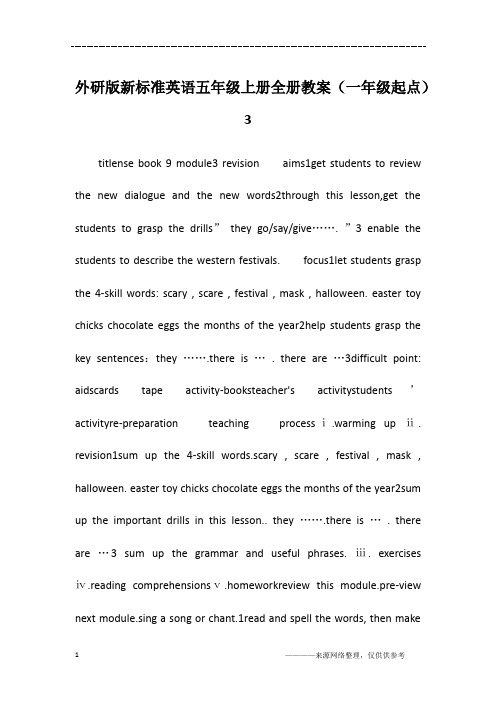
外研版新标准英语五年级上册全册教案(一年级起点)3titlense book 9 module3 revision aims1get students to review the new dialogue and the new words2through this lesson,get the students to grasp the drills”they go/say/give……. ”3 enable the students to describe the western festivals.focus1let students grasp the 4-skill words: scary , scare , festival , mask , halloween. easter toy chicks chocolate eggs the months of the year2help students grasp the key sentences:they …….there is …. there are …3difficult point: aidscards tape activity-booksteacher's activitystudents’activityre-preparation teaching processⅰ.warming up ⅱ. revision1sum up the 4-skill words.scary , scare , festival , mask , halloween. easter toy chicks chocolate eggs the months of the year2sum up the important drills in this lesson.. they …….there is …. there are …3 sum up the grammar and useful phrases. ⅲ. exercises ⅳ.reading comprehensionsⅴ.homeworkreview this module.pre-view next module.sing a song or chant.1read and spell the words, then makesentences by the words.2read and spell the sentences.3practise it in oral way.ⅲ..finish the exercises.ⅳ.finish the reading materials about western festivals.1疑问代词:whatwhenwherewho2一般现在时#单三形式feedbackthis module is more difficult for the students. some of them can’t talk about the western festival correctly and frequently.but most of them can finish the exercises by themselves. they can help each other for the comprehension.10月9日讲练能力培养1.this module is more difficult for the students. some of them can’t talk about the western festival correctly and frequently.2.but most of them can finish the exercises by themselves. they can help each other for the comprehension.teaching plan 10月18日title 课题nse book 9 module 4 unit 1aims 教学目的ⅰcan use “be going to”to express one’s plan. ⅱ.celebrating a birthday.focus 教学重难点ⅰ.learn new sentences “be going to”ⅱ.grammar and phrases. iii. subject personal and “be”aids 教学准备pictures, radio, an invitation of the birthday, etcteaching process 教学过程teachers activity ⅰ: warming up and revision 1. say hello to children 2 freetalk----easter ⅱ: leading-in 1.talk about one’s birthday.----- know “going to”ⅲ: listening& reading activities 1. listenand find “going to”2.answer the questions. “how old is amy going to do?”“what are they going to do?”“what is amy’s mother going to do?”“after lunch, what are they going to do?”3、words and phrases learning. 4、text reading 5. talk about amy’s birthday. iv. further development 1. give them introduce of the england birthday party.ⅴ: homework : think about how do you spend your birthday.students activity共7页,当前第1页12345671. hello 2. talk bout easter 1. the students look and answer. 1look and listen. 2answer: amy is going to be 11. they are going to sing and dance. she’s going to make a cake for amy. they are going to tidy up. 3practice the new words and phrases. 4 listen and repeat 5talk in groups then in class. listen and talk, know about the knowledge. re-preparation when is your birthday?----- month ------- how old are you going to be?feed ack 教学反馈teaching plan 10月19日title 课题nse book 9 module 4 unit 2aims 教学目的ⅰamy is going to be 11.what are you going to do at 9? ⅱ.learn to write a invitation of birthday .focus 教学重难点ⅰ.learn new sentences ⅱ.how to write a invitation card.aids 教学准备pictures, radio, an invitation of the birthday, etcteaching process 教学过程teachers activity ⅰ: warmingup and revision 1. say hello to children 2 sing english song. 3 invite some students talk about the plans of this weekend. ⅱ: leading-in 1.ask the students open their books,look at page16 ,then play the tape and answer the question what's about the card? 2.tell the students to write a invitation card by themselves. ⅲ: listening& reading activities 1. listen and look this card . point it 2.listen and find amy is going to be 11. 3、play the first version of the song and get the students to repeat the words. 4、now play the second version and let the students do some actions.5.listen and repeat6.once again7. listen and say part 28.drill9. do activity book part one. iv.further development 1. give them introduce of the england birthday party.ⅴ: homework : make a invitation of your birthday by yourself.students activity共7页,当前第2页12345671hello, teacher sings it. 2sing an english song. 3talk about their plans of this weekend. 1. the students look and answer. 2. write a card. 1. listen and point 2. listen and find 3. listen and repeat. 4. sing and do the actions. 5. read 6. listen and repeat 7. read 8. read look the pictures and say some sentences. 1.know about the knowledge re-preparation we can do the oral work first, then write it out. eg. change the subject “they”into“we”, “english”into “chinese”, etc. after practice let them write the card.feed back 教学反馈teaching plan 10月22日titlense book 9 module4 revision aims1get students to review the new dialogue and the new words2through this lesson,get the students to grasp the sentence,”amy is going to be 11.what are you going to do at the party?”3 enable the students to write an invitation of a birthday. focus1let students grasp the 4-skill words: invitation, reply2help students grasp the key sentences:amy is going to be 11.what are you going to do at the party? we/i are/am going to sing and dance. etc.3difficult point: written work. the use of”we and i”.aidscards tape activity-booksteacher's activitystudents’activityre-preparation teaching processⅰ.warming up ⅱ. revision1sum up the 4-skill words.invitation, reply……2sum up the important drills in this lesson.. amy is going to be 11. what are you going to do at the party? we are going to ……. i’m going to…….3 sum up the grammar and useful phrases. ⅲ. exercisesⅳ.reading comprehensionsⅴ.homeworkreview this module.pre-view next module.sing a song or chant.1read and spell the words, then make sentences by the words.2read and spell thesentences.3practise it in oral way.ⅲ..finish the exercises.ⅳ.finish the reading materials.be going toall the months fly by.三者都。
(完整版)北师大版高中英语必修3课文翻译module3
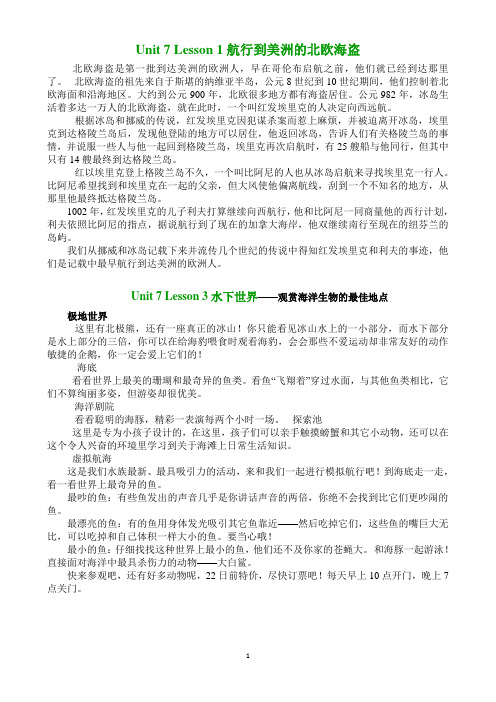
Unit 7 Lesson 1 航行到美洲的北欧海盗北欧海盗是第一批到达美洲的欧洲人,早在哥伦布启航之前,他们就已经到达那里了。
北欧海盗的祖先来自于斯堪的纳维亚半岛,公元8世纪到10世纪期间,他们控制着北欧海面和沿海地区。
大约到公元900年,北欧很多地方都有海盗居住。
公元982年,冰岛生活着多达一万人的北欧海盗,就在此时,一个叫红发埃里克的人决定向西远航。
根据冰岛和挪威的传说,红发埃里克因犯谋杀案而惹上麻烦,并被迫离开冰岛,埃里克到达格陵兰岛后,发现他登陆的地方可以居住,他返回冰岛,告诉人们有关格陵兰岛的事情,并说服一些人与他一起回到格陵兰岛,埃里克再次启航时,有25艘船与他同行,但其中只有14艘最终到达格陵兰岛。
红以埃里克登上格陵兰岛不久,一个叫比阿尼的人也从冰岛启航来寻找埃里克一行人。
比阿尼希望找到和埃里克在一起的父亲,但大风使他偏离航线,刮到一个不知名的地方,从那里他最终抵达格陵兰岛。
1002年,红发埃里克的儿子利夫打算继续向西航行,他和比阿尼一同商量他的西行计划,利夫依照比阿尼的指点,据说航行到了现在的加拿大海岸,他双继续南行至现在的纽芬兰的岛屿。
我们从挪威和冰岛记载下来并流传几个世纪的传说中得知红发埃里克和利夫的事迹,他们是记载中最早航行到达美洲的欧洲人。
Unit 7 Lesson 3 水下世界——观赏海洋生物的最佳地点极地世界这里有北极熊,还有一座真正的冰山!你只能看见冰山水上的一小部分,而水下部分是水上部分的三倍,你可以在给海豹喂食时观看海豹,会会那些不爱运动却非常友好的动作敏捷的企鹅,你一定会爱上它们的!海底看看世界上最美的珊瑚和最奇异的鱼类。
看鱼“飞翔着”穿过水面,与其他鱼类相比,它们不算绚丽多姿,但游姿却很优美。
海洋剧院看看聪明的海豚,精彩一表演每两个小时一场。
探索池这里是专为小孩子设计的,在这里,孩子们可以亲手触摸螃蟹和其它小动物,还可以在这个令人兴奋的环境里学习到关于海滩上日常生活知识。
牛津上海版六年级上册Module3 Unit 9 Picnics are fun课时练习(包含答案)
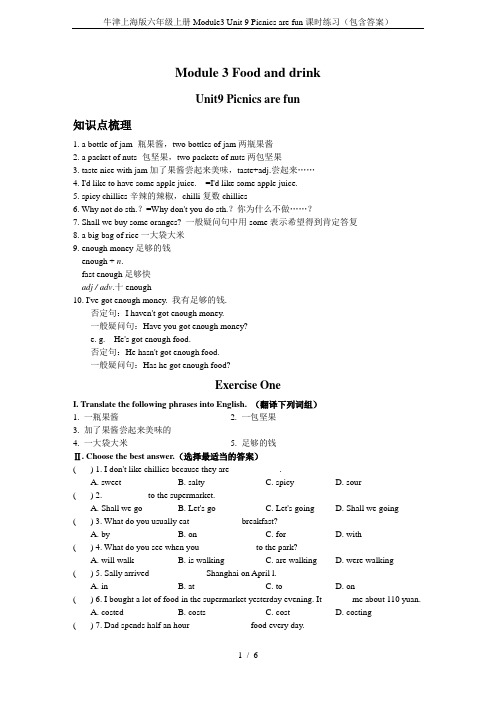
Module 3 Food and drinkUnit9 Picnics are fun知识点梳理1. a bottle of jam -瓶果酱,two bottles of jam两瓶果酱2. a packet of nuts -包坚果,two packets of nuts两包坚果3. taste nice with jam加了果酱尝起来美味,taste+adj.尝起来……4. I'd like to have some apple juice. =I'd like some apple juice.5. spicy chillies辛辣的辣椒,chilli复数chillies6. Why not do sth.?=Why don't you do sth.?你为什么不做……?7. Shall we buy some oranges? 一般疑问句中用some表示希望得到肯定答复8. a big bag of rice一大袋大米9. enough money足够的钱enough + n.fast enough足够快adj / adv.十enough10. I've got enough money. 我有足够的钱.否定句:I haven't got enough money.一般疑问句:Have you got enough money?e. g. He's got enough food.否定句:He hasn't got enough food.一般疑问句:Has he got enough food?Exercise OneI. Translate the following phrases into English. (翻译下列词组)1. 一瓶果酱_____________________2. 一包坚果______________________3. 加了果酱尝起来美味的___________________________________4. 一大袋大米____________________5. 足够的钱_______________________Ⅱ. Choose the best answer.(选择最适当的答案)( ) 1. I don't like chillies because they are ___________.A. sweetB. saltyC. spicyD. sour( ) 2. __________to the supermarket.A. Shall we goB. Let's goC. Let's goingD. Shall we going ( ) 3. What do you usually eat ___________ breakfast?A. byB. onC. forD. with( ) 4. What do you see when you ____________ to the park?A. will walkB. is walkingC. are walkingD. were walking ( ) 5. Sally arrived ____________ Shanghai on April l.A. inB. atC. toD. on( ) 6. I bought a lot of food in the supermarket yesterday evening. It ______ me about 110 yuan.A. costedB. costsC. costD. costing( ) 7. Dad spends half an hour _____________ food every day.A. to cookB. cookC. cookingD. cooked( ) 8. You can find __________ in the vegetable sectiomA. prawnsB. orangesC. tomatoesD. chickenII. Rewrite the sentences as required,(根据要求改写句子)1. It takes me about half an hour to finish the work. (就画线部分提问)__________ _________ does it take you to finish the work?2. I don't like lemons because they are too sour. (就画线部分提问)_____________ ___________ you like lemons?3. Kitty has already bought some vegetables. (一般疑问句)___________ Kitty bought ___________ vegetables _____________?4. Simon has lunch at school.(改为否定句)Simon___________ _____________ lunch at school.5. Don't play football on the road. (改为同义句)_____________ ____________ play football on the road.6. Shall we have some noodles?(改为同义句)___________ ___________ some noodles.Exercise TwoI. Translate the following phrases into English. (翻译下列词组)1. 进行野餐_______________________2. 一个好主意___________________3. 吃许多东西_____________________4. 准备一次野餐___________________5. 买些小吃_____________________Ⅱ. Choose the best answer. (选择最适当的答案)( ) 1. Shall we have a picnic ____________ Friday evening?A. onB. atC. inD. with( ) 2. Let ___________ go there with them.A. weB. usC. ourD. ours( ) 3. Shall I buy a _________ of nuts for them?A. pieceB. barC. cakeD. packet( ) 4. Please give me ____________ ink , please.A. anB. someC. /D. a( ) 5. Let's prepare _____________the picnic tomorrow.A. withB. forC. inD. by( ) 6. I'd like some chicken ____________, please.A. wingsB. wingC. the wingsD. the wing( ) 7. Come and have some nice _____________.A. lemonsB. lemonC. the lemonD. the lemons( ) 8. They are making a shopping ____________ for us.A. bookB. listC. shopD. cinemaIII. Fill in the blanks with the given words in their proper forms. (用动词的适当形式填空)1. __________ you usually _________(read) English at 7:00 in the morning?2. ___________ (not make) a noise! We ____________(have) a lesson.3. Last Saturday we went to the beach and __________(make) sandcastles there.4. Can you ___________ (see) the words on the blackboard ?5. Tom ____________(want) to have a picnic next week.6. Danny _____________ (eat) much food yesterday evening.7. Let's ____________(play) football now.8. Peter ____________ (watch) television every day.9. Peter and his friend, Mark _____________(visit) King's village tomorrow.10. Listen! Alice ____________(sing) an English song.11. They _____________(not do) their homework on Sunday.12. Mark's father ______________ (be) to Italy twice.13. There _____________ (be) a lot of milk in the fridge.14. This bottle of orange juice ___________ (cost) me 12 yuan.Exercise ThreeI. Fill in the blanks with the given words in their proper forms. (用单词的适当形式填空)1. Let _____________ (we) have a picnic with _______________ (they).2. These chicken wings are ____________(taste).3. I don't like these nuts because they are too___________ (salt).4. Shall we go __________ (swim) now?5. He is ____________ (prepare) for their picnic.6. We want to have some soft _____________ (drink).Ⅱ. Choose the best answer.(选择最适当的答案)( ) 1. I like chillies ___________ they are spicy.A. butB. becauseC. soD. and( ) 2. I would like to be a ___________ because I can teach children.A. firemanB. policemanC. doctorD. teacher( ) 3. Why not ___________ some spicy food?A. to haveB. havingC. haveD. has( ) 4. How much ___________ the sausages cost?A. doB. doesC. areD. is( ) 5. Children, it's time _____________ have supper.A. forB. withC. toD. /( ) 6. We mustn't talk ____________ in the library.A. loudlyB. quietC. quietlyD. loud( ) 7. Have you got enough money__________ this book?A. buysB. buyC. buyingD. to buy( ) 8. Today is a good day ____________our spring outing.A. toB. onC. atD. for( ) 9. -May I have ________ coffee after dinner?-Sure, but only _______________.A. some, littleB. any, littleC. some, a littleD. any, a littleIII. Rewrite the sentences as required. (根据要求改写句子)1.I would like apple juice because it is sweet. (就画线部分提问)__________ __________ you like apple juice?2. He would like some oranges because they're sour.(就画线部分提问)_________ __________ he like some oranges?3. There are some books and magazines on the shelf. (改为否定句)There __________ _____________books or magazines on the shelf.4. Why don't you draw a new picture?(改为同义句)___________ __________ draw a new picture?5. Sam does his homework at home. (就画线部分提问)__________ ___________ Sam do his homework?6. This is my personal computer. (改为同义句)The personal computer ___________ ____________.Exercise FourReading comprehension. (阅读理解)(A)Mr. White looks out of his window. There is a boy in the street. He is eating some bread. There is a dog in the street, too. The boy says, "Come here, good dog. I'll give you some bread. "The dog comes up. The boy kicks (踢) the dog. The dog runs away.Mr. White comes out of the house and says to the boy, "Come here, I am going to give you some money. " The boy is happy and goes to Mr. White. But Mr. White doesn't give him any money. He kicks the boy. The boy cries and says, "Why do you kick me? I don't ask you for any money.”True or False. (判断下列句子是否符合短文内容,符合的用“T”表示. 不符合的用“F”表示)( ) 1. The boy is having some bread in the street.( ) 2. The boy doesn't give the dog any bread.( ) 3. The boy likes the dog.( ) 4. Mr. White is going to give the boy some money.( ) 5. Mr. White wants to give the boy a lesson (教训).(B)IT'S MY BIRTHDAYBetty hopes you can come to her party!Time: 4:30 Date: Saturday, March 15thPlace: Flat 3A Xu Yang BuildingTelephone: 1256-4389Choose the best answer. (根据短文内容. 选择最恰当的答案)( ) 1. Betty is going to have __________ party.A. Teachers' DayB. an EnglishC. a birthdayD. a Chinese( ) 2. The party is on ______________.A. Sunday, May 16thB. Saturday, March 15thC. Monday, March 15thD. Sunday, March 6th( ) 3. The party is going to start at _____________.A. half past fiveB. half past fourC. a quarter to fiveD. a quarter to four( ) 4. She is going to have her party in ____________ Xu Yang Building.A. Flat 5AB. Flat 3AC. Flat 5BD. Flat 3B( ) 5. Which is Betty's telephone number?A. One two five six four three eight nine.B. One five six two four three eight nine.C. One four three eight nine six five two.D. One rune eight three four six five two.(C)It is Sunday afternoon. Eddie isn't doing his homework. He isn't watching TV, either. He is making a shopping list for his picnic with his parents. He is going to buy some sausages, some fruit, and some soft drinks. He is also going to buy some dog food for his little dog. What else is he going to buy? He is going to get some toys for his little sister because tomorrow will be her birthday.1. What day is today?____________________________________________________________2. What is Eddie doing now?____________________________________________________________3. Why is he going to buy sausages, fruit and soft drinks?___________________________________________________________4. Has he got a pet dog?_______________________________________________________________5. What is he going to buy for his little sister?______________________________________________________________(D)Read the passage and fill in the blanks with the proper words. (根据首字母填空)Look at my father. He is a doctor in a hospital. He works hard for all his patients. He always comes home l 1 . He often says to my mother, "My patients are w 2 for me. Because I can make them b 3 ." He always has 1 4 of work to do. When he comes back from w 5 , he reads some books about his work. He is really a model doctor. Everyone likes to talk with him.My father's friend, Eddie, is a teacher in a middle school. He is very f 6 to his students. He always comes to his o 7 early. He then goes to the classroom to look a 8the students and help them read aloud English. After work he often goes to the s 9 to buy some food. Tomorrow is Sunday. He is going to have a p 10 with his son. His son would like some soft drinks. And he a 11 likes oranges b 12 they are sweet.1. ____________2. ____________3. _____________4. ____________5. ____________6. ____________7. ____________8. ____________9. _____________ 10. ____________11. ___________ 12. ____________Unit 9 Picnics are funExercise OneI. 1. a bottle of jam 2. a packet of nuts 3. taste nice with jam 4. a big bag of rice5. enough moneyII. 1. C 2. B 3. C 4. C 5. A 6. C 7. C 8. CIII. 1. How long 2. Why don't 3. Has, any, yet 4. doesn't have5. You mustn't6. Let's haveExercise TwoI. 1. have a picnic 2. a good idea 3. have a lot of things 4. prepare a picnic5. buy some snacksII. 1. A 2. B 3. D 4. B 5. B 6. A7. B 8. BIII. 1. Do, read 2. Don't make, are having 3. made 4. see 5. wants 6. ate7. play 8. watches 9. are going to visit 10. is singing 11. don’t do12. has been 13. is 14. costsExercise ThreeI. 1. us. them 2. tasty 3. salty 4. swimming 5. preparing 6. drinksII. 1. B 2. D 3. C 4. A 5. C 6. A 7. D 8. D 9. CIII. 1. Why would 2. Why would 3. aren't any 4. Why not 5. Where does 6. is mineExercise FourA: 1. T 2. T 3. F 4. F 5. TB: 1. C 2. B 3. B 4. B 5. AC: 1. It is Sunday.2. He is making a shopping list.3. For his picnic.4. Yes, he has.5. He is going to get some toys.D: 1. late 2. waiting 3. better 4. lots 5. work 6. friendly 7. office 8. at9. supermarket 10. picnic 11. also 12. because。
外研版(三起)-英语-三年级下册--Module 9 Unit 1 I've got a new book. 教案
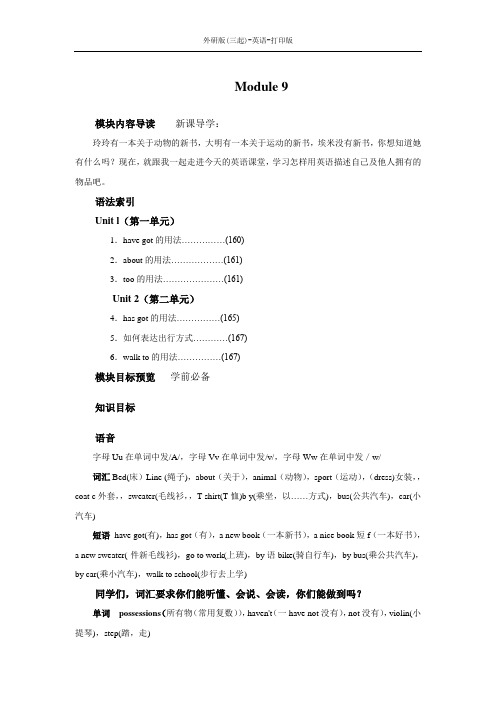
Module 9模块内容导读新课导学:玲玲有一本关于动物的新书,大明有一本关于运动的新书,埃米没有新书,你想知道她有什么吗?现在,就跟我一起走进今天的英语课堂,学习怎样用英语描述自己及他人拥有的物品吧。
语法索引Unit l(第一单元)1.have got的用法 (160)2.about的用法 (161)3.too的用法 (161)Unit 2(第二单元)4.has got的用法 (165)5.如何表达出行方式 (167)6.walk to的用法 (167)模块目标预览学前必备知识目标语音字母Uu在单词中发/A/,字母Vv在单词中发/v/,字母Ww在单词中发/w/词汇Bed(床)Line (绳子),about(关于),animal(动物),sport(运动),(dress)女装,,coat c外套,,sweater(毛线衫,,T-shirt(T恤)b y(乘坐,以……方式),bus(公共汽车),car(小汽车)短语have got(有),has got(有),a new book(一本新书),a nice book短f(一本好书),a new sweater(-件新毛线衫),go to work(上班),by语bike(骑自行车),by bus(乘公共汽车),by car(乘小汽车),walk to school(步行去上学)同学们,词汇要求你们能听懂、会说、会读,你们能做到吗?单词possessions(所有物(常用复数)),haven't(一have not没有),not没有),violin(小提琴),step(踏,走)短语:walk to walk步行上班同学们,词汇要求你们能听懂、会说、会读,你们能做到吗?句型某人有某物”的句型及其一般疑问句和答语。
I have got a new book.我有一本新书。
Have you got a new book?你有一本新书吗?_yes,I have.是的,我有。
3-Module 9 Unit1
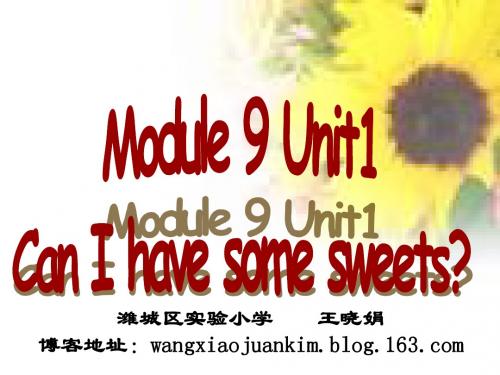
soup
bread
biscuits
D C A B
fruit
sweets
游戏规则: 每个单词用升降调 读两遍,图片被小厨师 代替的单词,只拍手不 读单词。
soup
bread
biscuits
fruit
sweets
游戏规则: •用最快的速度在纸上画出一种食物 •按A-B-C-D-A的顺序提问并回答 •完成后A举手(选出最快的四个组)
Example: Can I have some… ? Yes, you can./ Sorry, you can’t.
D C
A
B
What does Amy want to eat? Soup , sweets, bread.
Recite the text after class.
soup
bread
biscuits
fruit
sweets
Can I have some …?
Yes, you can. Sorry, you can’t.
D
C
A
B
I like soup, I like bread. I like sweets ,I like fruit. Can I have some? Can I have some? Yes, you can. Yes, you can. I like biscuits, I like cake. I like sweets, I like fruit. Can I have some? Can I have some? Sorry, you can’t. Sorry, you can’t.
it
biscuits cake
小学英语五年级上册第9-10模块 教案
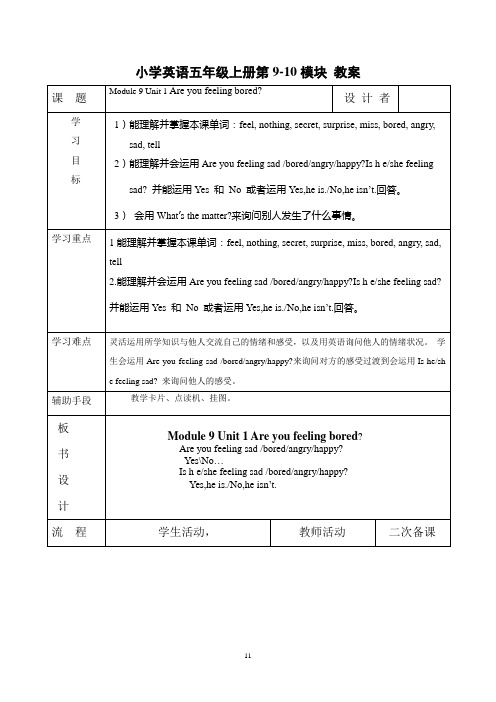
6.教师观察后发现一位学生在做和学习无关的事,然后指着这名学生让全班同学看:Look,Li Jun is playingwith a toy. I’m feeling angry.(做出非常生气的样子) Are you feeling angry?
小学英语五年级上册第9-10模块教案
课题
Module 9Unit 1Are you feeling bored?
设计者
学
习
目
标
1)能理解并掌握本课单词:feel, nothing, secret, surprise, miss, bored, angry, sad, tell
2)能理解并会运用Are you feeling sad /bored/angry/happy?Is h e/she feeling sad?并能运用Yes和No或者运用Yes,he is./No,he isn’t.回答。
Let’s learn.出示课题,引导学生打开书,并提问⑴听录音,整体感悟课文教师提问:Is Lingling feeling bored? Is Lingling feeling angry?
再听录音,学生跟读,并找出不明白的问题和生词,让学生板演在黑板上,然后采取“小老师”的方式,让学生上台解答、教授。
Ss:Yes./ No.启发学生说No ,of course not. (师生、生师、生生之间练习
S5:Yes./ No. T:Is he/she feeling angry? Ss: Yes,he is./No,he isn’t.学生和前后或左右的同学相互调查?Are you feeling angry?
新外研版八年级上册全部课文翻译(中文)

初二上册Module 1Unit 1 让我们尽可能多地讲英语同学们,欢迎回来!今天,我们打算谈论一下学习英语的好方法。
准备好了吗?谁有一些建议?在课堂上我们应该总是讲英语。
好!让我们尽可能多地讲英语。
为什么不在我们的笔记本上记下错误呢?那是个好主意,而且不要忘记在错误旁边写上正确的答案。
还有其他的什么吗?每天大声拼读生词是一个好主意。
非常感谢你,玲玲。
听广播怎么样?是的,那也有益于我们的发音。
但有很多生词。
你们不必理解每个单词(的含义)。
你们只需要听关键词和主要意思。
阅读也一样。
英语故事如此有趣。
通过阅读我逐渐了解了世界上的许多事情。
我认为写作也很重要。
我们为什么不尽量去找些讲英语的笔友呢?我们可以给他们写信。
太棒了!我同意你(的提议)。
Unit 2 你应该向她微笑!很多学生咨询如何提高他们英语水平的建议。
这儿是三个基本问题。
第一个问题是关于理解英文电影和歌曲的问题。
来自湖北的李浩写道:“我喜欢看英文电影,听英文歌曲,但我只能理解一点儿。
我可以怎么做呢?”看电影和听歌曲是学习英语的很好的方式!看上或听上几遍,并猜测生词的含义。
每一遍你都会学到新东西。
我还建议你和朋友们谈论一下这些电影或歌曲。
第二个问题是关于说的。
来自吉林的王帆写道:“我们学校有一位来自美国的老师。
我很腼腆,不敢与她说话。
我该怎么办呢?”你可以说:“嗨!你好吗?”“你喜欢中国吗?”这些都是展开交谈的好方式。
在你开始(讲英语)前,你应该向她微笑!记住这一点:不要害羞,去试一试。
第三个问题是关于词汇的。
来自安徽的张雷写道:“我写下生词,但我很快就忘记了它们。
我怎样才能记住它们呢?”不用担心,忘记生词是很自然的!我建议你每天把4个或5个单词写在纸片上并放在你的房间里。
看到这些单词的时候就读一读,并且尽量使用它们。
Module 2 我的家乡和我的国家Unit 1 它比许多其他建筑物都高。
嘿,大明!你的周末过得怎么样?很好!我去深圳了。
深圳在哪儿?哦,它在靠近香港的海岸线上。
三年级上册英语教案Module9unit1Thisismymother外研社三起

三年级上册英语教案Module9unit1Thisismymother外研社三起Module9一.教材分析:本模块是新标准英语(三年级起点)上册第9模块,根据新课程标准提出的要求,要使学生初步建立学习英语的自信心,初步具备日常交流的能力。
本模块是在学生学会自我介绍、交流、教室、朋友等简单信息的基础上学习介绍自己的家人及他们的职业。
二、学情分析本课的教学对象是三年级学生,通过第七模块的学习,学生会用This is my......介绍自己的物品,因此用This is my......介绍自己的家人,相对容易一些。
本单元语法教学的重点在于教会学生区分:He`s a......, She`s a......。
Unit1 This is my mother.教学目标:(一)知识目标:1.学生能够听懂会说单词mother, father, me, grandma, grandpa, sister, brother2.学生能够听懂、会说目标语句:This is my …That' s … She's… Is this your…? 及回答(二)技能目标:1. 学生能够在创设的情景中运用句型This is my …介绍自己的家人,运用句型Is this your…? 及回答了解别人的家庭成员。
能够灵活运用功能语句在真实的生活情景中介绍自己的家人,了解别人的家2. 庭成员。
(三)情感目标:培养乐于与人合作的意识,培养学生对自己家庭的热爱。
教学重难点1、重点:能在真实情境中熟练运用目标语句This ismy …That's…向别人介绍自己家庭成员2. 能在真实情境中熟练运用目标语句Is this your…? 及回答了解别人的家庭成员。
教具:多媒体、录音机、单词卡片、教师和学生各自全家照片。
教学过程:Step 1: Warm-up1、师生相互问好齐唱一首英文歌:What's this?2、3. 教师假装边找东西边问:Where's my pen? Where's my book?然后把一个学生的笔和书拿过来,对全班说:Is this my pen? Is this my book? 教师回到讲台上,找到自己的笔和书,对刚才的学生道歉说: Oh! Sorry. Here's your pen. Here's your book.4. This is my book. Here's a story for you. Now please turn to page 50, look at activity1, listen carefully.5.再次播放录音,学生跟读。
- 1、下载文档前请自行甄别文档内容的完整性,平台不提供额外的编辑、内容补充、找答案等附加服务。
- 2、"仅部分预览"的文档,不可在线预览部分如存在完整性等问题,可反馈申请退款(可完整预览的文档不适用该条件!)。
- 3、如文档侵犯您的权益,请联系客服反馈,我们会尽快为您处理(人工客服工作时间:9:00-18:30)。
Retell the text.
Para.1 benefits, flat, plenty of Para.2 in the 1960s, not allowed, hopeful, neighborhoods, wherever, thieves Recite Para. 3 However, more than 30 years later…. Para. 4 less traffic, Indeed, thanks to…
Return of the white bikes!
Objectives
You will be able to
-- read and understand the main points. -- retell the text. -- say the advantages of bikes over cars. -- discuss the possibility and measures of using bikes in Beijing.
to get there. think carefully work out We'll have to _______how much food we'll need for the party. calculate The plot is very complicated - it'll take work it out you a while to_________. understand Things will_______, you'll see. work out get better
6. The video cover says it includes two 40-minute fitness workouts plus an _______ extra 10-minute jump-start mini workout _______. work out We need to ________how we're going
boat, ferry, ship plane, balloon, hry, helicopter, lorry, motorcycle, ship, the tube / underground
bicycle, bus, car, lorry, motorcycle, train
What was the result? The result → problems
_____________________ within weeks.
Group Discussion
1 Do you think “white bikes” will be good for Beijing? Why? (e.g. convenience? benefits?) 2 What advice would you give on the future “white bikes”? e.g. design? any hightech? where to park them? how to use them? … 3 What are the author’s purposes for writing this article ?
Taking actions What did they do?
1) painted bicycles white, placed them ______________ around Amsterdam; 2) ________________ to take them; 3) wherever sb. finished a journey they _________________________;
reappearing of the white bikes
getting white bikes back from thieves
Main idea of each Para.
Para. 1 Para. 2 Para. 3 Para. 4 Why Amsterdam is called the “City of Bicycles” White bikes in 1960s
Wheels
Means of transport
Travel on land Travel by sea Travel in the air Cause pollution Have got wheels bicycle, bus, car, lorry, motorcycle, train, minibus
White bikes 30 years later
Effects of the white bikes
Read and answer.
What are the advantages of bicycles over cars? 1.Convenient. 2. Save energy. 3. Reduce pollution. 4. Provide free public transport. 5. Less traffic in city centres. Read again .
Ex. 3, P. 36.
Fill in the blanks according to the text.
1. It is a good city for cycling because _____. (3 reasons) 2.The group of cycling fans painted hundreds of bikes white because ____. 3.More than 30 years later, the “white bike” is back in town and it works this time because _____________. 4. There is already less traffic in central Amsterdam, because ________. 5. Thanks to the cycling fans in the 1960s, _________.
3. In the end, she just got fed up _________ and left. City golfers ____________ conditions are fed up with on the course. benefit 4. New regulations will greatly _______ the region's poorest residents. benefited from Many thousands have ____________ the new treatment. 5. The building work is taking quite a therefore long time, and ________ costing us money. adv. therefore You may ________ read the criteria and see if your answer matches them.
To call for the public awareness of protecting the environment as well as using the clean transport.
Language points 1.他决定把天花板涂成淡蓝色, 这会使屋子看起来很清爽。 He has decided to paint the ceiling light blue, which can make the room look nice and cool. 2.由于史密斯医生的努力,我现在又能走路了。 Thanks to the efforts by Dr. Smith, I can walk around again now. thanks to somebody/something due to/ because of/ owing to/ as a result of
1960s 30 years later a group of cycling fans Purposes What were
1) save energy 2) 3)
their hopes?
What do people do 30 Solutions years later?
1) with a computer chip, have to _________________________; 2) are an unusual design ____________________; 3) are parked at _______________; people have to take them to ______ ____________.
Why do people enjoy cycling?
“City of Bicycles” —
Amsterdam
capital of The Netherlands Holland
Guess from the title
RETURN of the white bikes!
returning a borrowed white bike
6. He works out with weights _______ twice a week. to make your body fit and strong by doing exercises, exercise Homework 1 Organize your discussion into a short passage. 2 P. 78 Exs. 3, 4. 3 P. 85 focus on reading.
